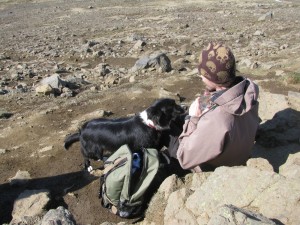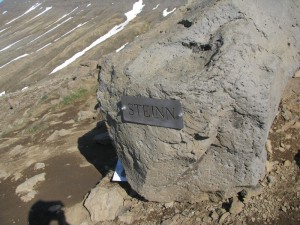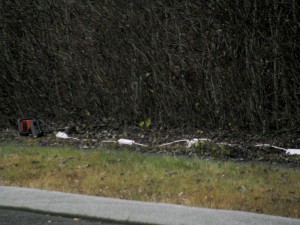Icelandic proverbs Posted by hulda on Nov 8, 2012 in Icelandic culture, Icelandic customs, Icelandic history
 What taught the naked woman to spin thread? Or why does one become happy twice when one sits on a stone? Icelandic proverbs show how the people here think and view the world around them, and besides that they’re often very sharp and accurate to their point. Let’s look at some of my favourites!
What taught the naked woman to spin thread? Or why does one become happy twice when one sits on a stone? Icelandic proverbs show how the people here think and view the world around them, and besides that they’re often very sharp and accurate to their point. Let’s look at some of my favourites!
A while ago I received a request to include word-to-word translations along with the real ones to better help understand how the language works. I thought it sounded an interesting idea so I’m trying it here. Any thoughts about it? Should I keep doing this in the future as well or would you rather just get the real translation?
I’ve a feeling that even the nicest parking inspector would not turn a blind eye to this type of parking…
Svo má brýna deigt járn að bíti.
(“So may sharpen dull iron to bite.”)
“A dull piece of iron can be sharpened to a blade”, a soft person can, if needed, treat you harshly as well. It can be used for example to hint that even though someone’s been very lenient towards a certain person their attitude may eventually change.
Litlir katlar hafa og eyru.
(“Small pots have as well ears.”)
“Even little kettles have ears (= handles)”, which is the good old “even the walls have ears” in Icelandic style. I always found this one really cute!
Þrínættur gestur þykir verstur.
(“Three nights old visitors are considered the worst.”)
“Visitors become unwanted after three nights’ stay”. Another easy one: a visitor should not overstay their welcome. There’s a similar saying in Lithuanian – “fish and visitors begin to smell after three days”.
Tvisvar verður sá feginn sem á steininn sest.
(“Twice becomes that one happy who on the stone sits.”)
“The one who sits on a stone becomes happy twice.” This one’s so Icelandic it may be difficult to figure out even after it’s translated. It means that when you’re really tired of walking outside you’ll feel very happy when you finally get to sit on a stone to rest. Since they’re not very pleasant to sit upon you’ll feel happy for a second time when you stand up and continue on your way.
Sá kann ekki að segja af súru sem aldrei sýpur nema sætt.
(“That one knows not to say of sourness who never sip except for sweet.”)
“The one who’s only tasted sweet cannot describe sourness”. The one who’s always had it easy should not pretend to know about the hardness of somebody else’s life.
Ekki tjáir að binda um banasárið.
(“No meaning to bind a deadly wound.”)
“There’s no point in trying to bind a deadly wound.” When things go so badly wrong that there’s no turning back there’s often no use in trying to mend them. It’ll be effort and energy wasted with little to no result, so it’s better to just leave them be.
Mark Twain should not bother Hitler while he’s driving the bus.
Enginn er alheimskur ef þegja kann.
(“No one is totally stupid if falling quiet knows how to do.”)
“No one who knows how to be silent is totally stupid.” This is a way of saying “he who knows he knows nothing knows more than the one who does not know he knows nothing” and “if you know you’re stupid, don’t open your mouth and let everyone else know it too” in one tight package. The idea behind this proverb goes back in time all the way to the medieval times – Hávamál, the viking era book of advice on life in general, stresses the importance of knowing how and when to be quiet.
Sannleikurinn er sagnafár en lygin langorð.
(“The truth is few of verbs but the lie long of words.”)
“It takes but a while to tell the truth but to lie takes a long time.” This one seems to have a double meaning. First of all, the person who speaks lengthily about something is more likely to be lying than the one who says very little about the same matter. The other way of understanding this is that telling the truth is quickly over and done with, but a liar will have to keep lying more to keep up the pretense around their lies.
One of our neighbours showing some creative problem solving skills: what would you do if the cord of your hedge cutter was not long enough?
Neyðin kennir naktri konu að spinna.
(“Necessity teaches naked woman to spin thread.”)
“A naked woman will learn to spin thread out of necessity”, or to use a well-known English equivalent, “Necessity is the mother of all inventions”. This is one of the most famous Icelandic proverbs and for a good reason: anyone caught naked in Iceland will very quickly think of clothes; if for no other reason then because the winter is coming and it’s getting really, really cold!
Thank yous for helping me out with the first proverb go to Heiða and Friða! I could not have fully understood it without your help, guys!

Build vocabulary, practice pronunciation, and more with Transparent Language Online. Available anytime, anywhere, on any device.
About the Author: hulda
Hi, I'm Hulda, originally Finnish but now living in the suburbs of Reykjavík. I'm here to help you in any way I can if you're considering learning Icelandic. Nice to meet you!








Comments:
Judith Jesch:
I always thought the little kettles (or cauldrons would be better, since they have two handles) were children and the proverb a reminder not to speak about sensitive or adult matters in front of the children.
hulda:
@Judith Jesch That would be such a cute explanation to it! It’s always a bad idea to talk about sensitive matters in front of children – it’s a surefire way of the news escaping and likely in a very embarrassing way. 😀 I’m almost certain though that the “even the walls have ears” is a closer translation to the proverb. The word “little” in this context doesn’t mean that the listening one is of small size, but rather that if there’s even the smallest chance someone will overhear you you should be very careful about what you say.
Bandula:
@hulda I am also an islander coming from the small Indian ocean island of Sri Lanka where two languages – Sinhalese and Tamil – are spoken while English is taught and used mostly by elites as a second language. I find your dialogue on Icelandic very interesting indeed. My own mother tongue is Sinhalese which has evolved out of the languages spoken in the Indian subcontinent and, interestingly, quite a few Portuguese, Dutch and English words too have found their way into Sinhalese, Sri Lanka having once been ruled by Portuguese, Dutch and British colonialists from 1505 till 1948. So, Sri Lanka, I would say, is a linguistic cauldron. Now, thanks to the internet, the said linguistic evolutionary process is moving ahead fast and hence, Sinhalese would make an ideal language for any student of comparative linguist.
hulda:
@Bandula Sinhalese sounds fascinating – it’s the exact opposite in language development than Icelandic in that Iceland was separated from the rest of the world for a long, long time and very little changes happened with the language. Studying language is always studying its history as well, which is why all language learning is a great way of gaining insight into other cultures and broadening one’s knowledge of the world. 🙂
Casey Goranson:
These proverbs are absolutely, utterly and thoroughly brilliant and beautiful! Earthy, almost brutal in their honesty — they’re relics of a time when words could kill.
hulda:
@Casey Goranson I’m glad you liked them, and indeed for the people of this island life has for most of their history been a struggle. Words are still important, although nowadays they’re thankfully not as lethal as they once could be.
Just in case you’re interested, I’ve written another post about Icelandic “proverbs” as well, although they’re so old I’m not sure the word proverb completely suits them: they’re from Hávamál, Óðinn’s Words.
https://blogs.transparent.com/icelandic/2013/04/16/the-wisdom-of-the-vikings-havamal/
Kris Olafson:
@hulda Dearest Hulda
I’m half Icelandic American and I try to follow your blog and Twitter for quite a while now…
But I am seasonal with my studies of Icelandic and very poorly learned…
Thanks so much for keeping this blog and learning going!
I am interested about two specific superstitions my father used
1. The little people are a very big part of their beliefs
2. My grandfather spoke of never letting a rocking chair be allowed to rock on its own because of fear of someone in the house might die if nobody was using the chair…he was from near egilstadir and I always wondered where these originated or if they still use them today
Last but not least, in the sagas there are poetic verses that the ancestors used….
hulda:
@Kris Olafson Hi Kris, and nice to meet you! Those are quite interesting questions, I hope you don’t mind long answers. 😀
1. By little people I assume we’re talking about huldufólk (hidden people) or álfar (= elves). To be honest there’s no exact difference between the two, except that curiously it’s usually the huldufólk that are described to be like Tolkien elves, whereas álfar can be almost any supernatural creatures.
Whether Icelanders believe in the hidden people… not really. It’s a popular myth that they do, but in reality a grand majority would say they don’t. That said there are still people who claim to have seen huldufólk, having completed a request by them or accidentally angering them with bad results. When it comes to these people they will say with 100% certainty that the hidden do exist, but it’s good to remember they’re a minority. It’s not only Icelanders either, there’s at least one story by a foreigner who was asked to build a fence around a certain area to make sure the huldufólk who live there are left in peace.
It’s also true that if a certain place is known as a place of huldufólk it’s generally left alone, hence stories of roads being built around f.ex. elf rocks. This could also be done to avoid upsetting the Icelandic humanfolk who tend to feel very protective about local elf rocks! 😀
As for beliefs in general huldufólk rank high, only followed closely by draugar, an Icelandic form of a ghost/undead.
2. The rocking chair belief is actually quite European! I’m guessing though that it originates in Ireland, but similar beliefs exist in many other European countries as well. In some it’s believed it’ll cause a family member to die, some say merely something unfortunate will happen. It’s also thought to interest evil spirits who will then sit in it.
It would not be surprising if a similar belief existed in Iceland, though I’m not that familiar with the lore around Egilsstaðir. However, during the Medieval times Icelanders brought quite a few Irish ladies along with them (so many that today every Icelander has Irish blood if going back in time enough) and it would not be the only Irish belief that Icelanders took on. 😀
Not sure about that last part but yes, sagas are full of old poetry which in part is how we know what the Medieval poetry sounded like, how it worked and for what purposes it was used. Icelanders were the last people who could compose this poetry, a fact mentioned in a few sagas, and with this skill some of them even achieved high positions in the courts of Europe.
Hillary:
I love this post! I was searching around trying to find a translation for the proverb I found in my Easter egg. It seems common when I looked it up, but I can’t find a good translation for “Sá er drengur sem við gengur.” I wanted to submit for your consideration in case you’d like to do some more translations. 🙂
hulda:
@Hillary It’s definitely the time of the year when everyone in Iceland’s doing just that – my FB is full of people, immigrants AND Icelanders, wondering what a certain proverb could mean. Yours is a little bit unusual, so I was planning to write my next entry on this particular type. 😉
Alistair:
Thank you so much for these. I love it as much I love Iceland. <3
hulda:
@Alistair Always happy to hear! Feel free to visit us anytime (unless you’re already here of course)! 🙂
James Peet:
Hello Hulda!
My wife and I have just returned from our first trip to Iceland. We love Reykjavik! The place is beautiful and everybody was really friendly and genuine.
I stumbled upon your blog while looking for Icelandìc proverbs, as we saw the “Everything is hay in hard times” saying. I love your blog! We happened to listen to a radio programme on the bbc, about the climate change in the Icelandic region. While talking about the geothermal waters, there was a place with waters too hot to touch, and the professor talking to the presenter mentioned a saying about tourists not being as wise to this as the locals – “It only takes 3 minutes to cook a tourist”. I love the dry sense of humour of Iceland! Thanks, James, UK.
hulda:
@James Peet Oh man, that does sound like Icelandic sense of humour… although to be fair an Icelander most likely cooks just as fast if they step beyond the boundaries of a flimsy little string attached around life-threateningly dangerous areas.
Glad to hear you enjoyed your stay, uncooked! 😀